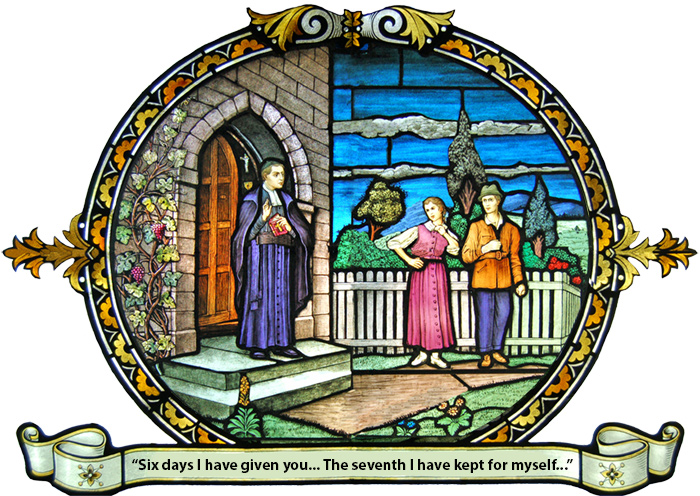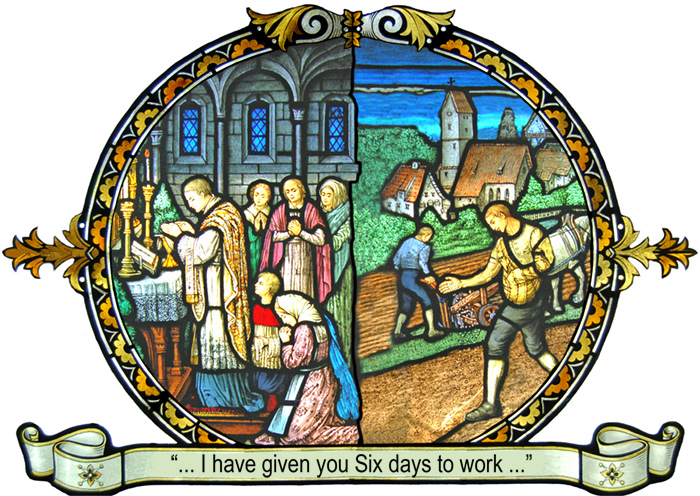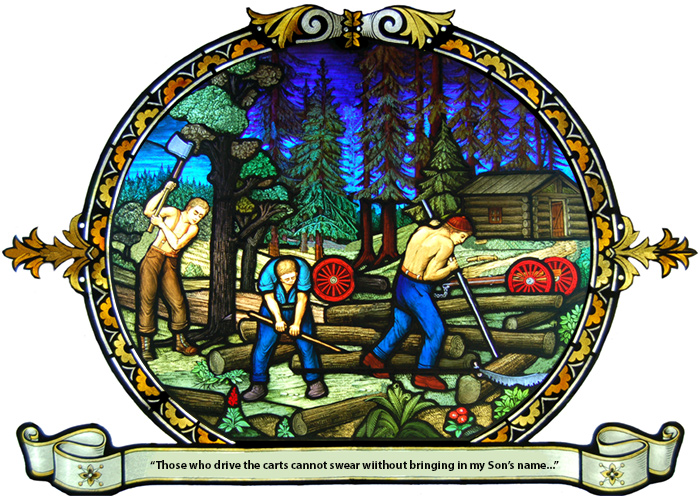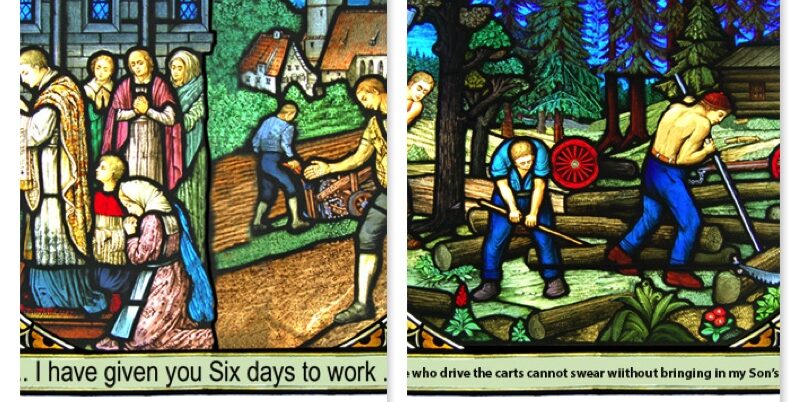Featured image above shows two stained glass windows in the “Mary Keane Chapel” at the “La Salette Shrine” in Enfield, New Hampshire.
There is a little-known but Vatican-approved apparition called Our Lady of La Salette. Catholic Straight Answers explains the basics: “On Saturday afternoon, September 19, 1846, two children– Maximin Guiraud (age 11) and Melanie Calvat (age 14)– were tending sheep for their employers near La Salette in the French Alps. The effects of the French Revolution which had terrorized the Church, the blood spilt during the reign of Napoleon, the increasing secularization of social thought, and the rising political turmoil enveloping Europe had taken a serious toll on the faith of the people. In the parish of La Salette, fewer and fewer people attended Mass and the sacraments were neglected. Cursing had overtaken praying; licentiousness, purity; and greed and self-indulgence, piety and sacrifice.”
So important was the Mother of God’s admonition on the Second Commandment (not taking God’s name in vain) and the Third Commandment (Keeping Holy the Lord’s Day) that a community in New Hampshire constructed a chapel with Nine Windows recounting the message of La Salette, with the Second Window referring to the Third Commandment. Then, the Third Window refers to the Second Commandment.
Yes, I realize the makers of that chapel probably should have put the windows in order of the Decalogue in the stained-glass order. But they didn’t ask me how to design that chapel. Also, as far as confusing topics on the Commandments, keep in mind that the Sabbath is still considered Saturday in Latin and most romance languages. This means we Christians are not commanded to keep holy the Sabbath, but rather to keep holy the Lord’s Day—Dominica in Latin and Domingo Spanish. That is, Sunday in English.

The above chapel’s website describes the first stained glass window of La Salette as explaining Mary’s admonition in general to Catholics: “How long have I suffered for you! If my Son is not to abandon you, I am obliged to entreat him without ceasing. But you take no heed of that. No matter how well you pray in the future, no matter how well you act, you will never be able to make up what I have endured on your behalf.”

Then, under the second window (above) we see a reference to the Third Commandment of the Decalogue: “I have given you six days to work. The seventh I have reserved for myself yet no one will give it to me. This is what causes the weight of my Son’s arm to be so heavy.”

Then, under the third window (above) we see a reference to the Second Commandment: “The cart drivers cannot swear without bringing in my Son’s name.”
Then the Immaculate Virgin Mary said: “These are the two things that make my Son’s arm so heavy.” That is, two of the most wicked sins of French Catholics in the 19th century were not keeping holy the Lord’s Day (Third Commandment) and taking the Holy Name of Jesus in vain (Second Commandment.) These are two commandments we can easily tighten down, hence the name of this article, Stop Compromising On These Two Commandments!
In March of 2024, I wrote an article asking: If you can’t find a TLM or Divine Liturgy on a Sunday, are irreverent Masses still binding to fulfill the Sunday obligation? The answer is no. If you are scandalized by that answer, read the article. One person I quote in that article is Dr. Kwasniewski who writes, “It’s not uncommon for people —even Catholics who are striving to live by tradition —to think that a grave or very grave reason is necessary to dispense from going to Mass, while simply a just reason or no reason at all suffices for doing servile work on a Sunday or Holy Day. Both views are false.” (emphasis mine.)
I agree. To Dr. K’s assertion, I add: Even less does the Third Commandment bind a person to receive Holy Communion on a Sunday. Remember, one of the seven precepts of the Catholic Church is to receive Holy Communion at least once a year, and that is listed right next to another precept: Go to confession at least once a year. Notice there’s almost a one-to-one correlation of confession to communion!
All in all, you are not required to receive Holy Communion on a Sunday. Furthermore, you and your family are only required to go to Church if you’re physically able to go there and if the Mass you’re headed to is non-sacrilegious (again, see above linked article if you’re challenged by this.) But you are required to make Sunday look like a very different day from the rest of the week by keeping Holy the Lord’s Day.
Yes, all of Sunday.
Obviously, the bare-minimum of the Third Commandment is attending Holy Mass on Sunday. I’m not saying in the above paragraphs people should get lazy on it. There are people who drive very far for the TLM or the Divine Liturgy. If you can do that, you should. Jesus died for you on Calvary. The least you can do is get in an air-conditioned car or heated homeschooling van and attend the Holy Mass which is the re-presentation of the Sacrifice of Calvary.
So, of course you are supposed to go to Sunday Mass, unless, for example, your children are going to see lay people touch the Most Holy Body and Blood of Our Lord Jesus Christ. Then, you need to reconsider. But attending Sunday Mass is normally promoted as the bare minimum of keeping the Third Commandment in terms of Catholic moral theology.
Still, all of Sunday should be different from the other six days of the week, as far as keeping a day of prayer and recreation, never shopping. For example, St. John Vianney said “I see them pushing their carts, and I see them pushing them into hell.” (In that chilling admonition, the saint meant the danger of farmers’ carts of French Catholics in the 19th century, but I always think of that line with modern shopping carts every time I pass a crowded Wal-Mart or Target on a Sunday.)
As most of you know, the Catholic Church’s rule on Sundays was always to refrain from unnecessary work. Of course, there is clearly no sin if an RN in an emergency department has to work on certain Sundays. But that nurse should at least request Sundays off. You might be surprised: Very few Christians request Sundays away from work, so it might be easier to get Sundays off within some work environments than the average cynical Catholic might expect. Pray to your guardian angel before such a request for Sundays off, and you might see miracles!
Furthermore, the old-school corollary to “no unnecessary work on Sundays” was always to do less than 2 hours of manual labor (unless working for a charity like your local Church, and then more is allowed if it doesn’t take away from worship or family time.) Also, keep in mind that Sunday work-load is a 2-hour limit, not a 2-hour requirement.
Some people say that 2-hour limit is harder to keep now in the 21st century. But I say it is easier to follow, especially if you own a washer, dryer and dish-washer. In fact, I have probably only done laundry three times on Sunday the last three years, and in that I made sure my work was under two hours of manual labor. (Recreation like bike riding and running is encouraged. Such activities are not considered “manual labor.” Do that as much as you want as long as it doesn’t mean skipping Mass, Rosary, family time, etc.)
Look, I am not some paragon of being a Commandment-Keeper, but I can say in all honesty I believe I have only shopped at a grocery store maybe twice over the last decade on a Sunday. Each trip was only for something small I needed (not a month’s shopping list.) Also, I have only hit the Amazon purchase button about three times over the last decade on a Sunday. In fact, my Amazon settings allow no deliveries on Sunday. I have had it that way for nearly five years. I’m not saying this to brag, but to show how easy it is to stay zealous and jealous for your Sundays to belong to God.
Now, as far as the Second Commandment, I don’t believe I have ever said the Holy Name of Jesus in vain over the course of my entire life. The fact is: If you only use the Holy Name of Jesus for praise or petition, this resolution becomes easy. What is harder as a firm resolution to keep is this: To correct people who publicly abuse the Holy Name of Jesus. As far as a minimum on this, I believe you should correct any family member (whether younger or even older) or visitor who misuses the name of Jesus in your home. Don’t worry about the consequences. The consequences will be worse for them (and possibly you) by enduring such blasphemy under your own roof.
Keep in mind I never correct people who cuss (S-word or even F-word.) But I do publicly correct people who blaspheme. My resolution in public has been for nearly a decade to correct any stranger who takes the name of Jesus in vain. If I hear the name of Jesus misused, I either say “Praise His Glory!” or if I am feeling more bold, I say charitably but firmly: “That is my Savior and Yours, so please respect the Name of Jesus.” If they then say, “No, that’s your Savior not mine,” I simply reply: “He’s the Savior to both of us, whether you recognize it or not.”
But wait, why would an ex-Christian or pagan in public misuse the Holy Name of Jesus if he just believed Christ was a random rabbi from the 1st century? The very misuse of the Name of Jesus proves He is different from every religious leader in all of history. The very misuse of the Name of Jesus shows there is malice or demons behind such habits of ex-Catholics or pagans. I always make sure to teach the following spiritual reality when I teach catechesis: To say the name of Jesus in hatred attracts demons and repels angels. But to say the sweet and holy name of Jesus in love attracts angels and repels demons.
Do you see why Mary was so serious in her admonitions on the Second and Third Commandments at La Salette? Still, I know some people will say “Well, I don’t have to believe Marian private revelations to be saved.” Maybe not, but it’s the same message of Christ in the Gospel—that the keeping of the ten commandments will determine if you go to heaven or hell forever:
And behold, a man came up to Him, saying, “Teacher, what good deed must I do to have eternal life?” And He said to him, “Why do you ask me about what is good? There is only One who is good. If you would enter life, keep the commandments.” He said to Him, “Which ones?” And Jesus said, “You shall not murder, You shall not commit adultery, You shall not steal, You shall not bear false witness, Honor your father and mother, and, You shall love your neighbor as yourself.”—Mt 19:16-19
